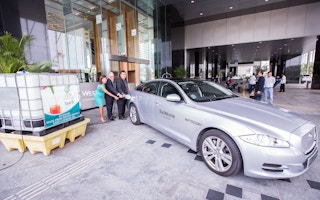Singaporean firm Alpha Biofuels and The Westin Singapore have launched Singapore’s first green luxury limousine fleet, which will be partly powered with recycled cooking oil.
The clean energy company has signed a three-year agreement to provide the upscale hotel with biodiesel to power two of its Jaguar XJ sedans.
Alpha said seven per cent of the biodiesel is obtained by recycling waste cooking oil, while the remaining 93 per cent is from conventional diesel – a blend known as B7.
The firm started the project in November last year. Each kilogramme of biodiesel that Alpha produces emits 65 per cent less greenhouse gases over its life cycle compared to the same quantity of ultra low sulphur diesel, according to research conducted by the Agency for Science, Technology and Research (A*Star).
“This is no longer technology of the future. Our pioneer batch of green luxury limousines proves that it is now commercially viable to power a transportation fleet in an environmentally responsible manner,” said Allan Lim, chief executive officer of Alpha Biofuels.
Lim hopes that the proportion of biodiesel that comes from recycled oil can be raised to 20 per cent from seven per cent in the near future.
“
Our pioneer batch of green luxury limousines proves that it is now commercially viable to power a transportation fleet in an environmentally responsible manner
Allan Lim, chief executive officer of Alpha Biofuels
Although he acknowledged that the impact of powering two vehicles on biodiesel is small in the context of the larger challenge of climate change, Lim said the project is a “good start” and hopes to be able to expand the project by approaching other hotels.
“This is just a start, we want to work out a business model for the hospitality industry … and we hope that through this we increase the demand, and more biodiesel can be produced,” Lim told Eco-Business.
Alpha Biofuels uses a micro-refinery called MX to turn carcinogenic waste oil into clean fuel in the form of biodiesel. The converted oil can be used to power standard diesel generators, heavy plants and construction machinery.
The firm, which began 2004, has 300 recycling partners across Singapore and collects about four to five tonnes of waste cooking oil per day. It recycles this into biodiesel at their plant in Tuas. Alpha has spent S$2 million developing this technology since 2007 and continues to invest in research and development to improve their technology, said Lim.
The firm hopes that as awareness about the potential of recycling waste cooking oil increases, it will be able to secure more partners. Lim estimates that Singapore produces about 1,000 tonnes of waste cooking oil per month, which means there is a huge potential for market development in the country.
Currently, there are third party vendors who pay some food outlets for their waste cooking oil, which is then repackaged and resold as new cooking oil in developing countries, said Lim. There is no regulation of any exports of such cooking oil out of Singapore, he added.
For this project, The Westin Singapore expects to produce 7,800 kilogrammes of waste cooking oil in a year, which can generate enough biodiesel to help power the two Jaguar limousines over approximately 150,000 kilometres – the distance the hotel estimates the fleet will cover each year.
Initially, Alpha Biofuels will refine the oils in its plant in Tuas, but The Westin plans to have a micro-refinery installed on the fifth floor of its hotel building in the coming months.
“The Westin Singapore is committed to caring for our planet and doing more to consume less,” said Lance J. Ourednik, general manager of The Westin Singapore. “We embrace our responsibility for environmental stewardship and continually look at ways of integrating leading environmental practices and sustainability principles into our business operations. This initiative provides an innovative opportunity for us to minimise waste and conserve natural resources while delivering exceptional guest experiences.”
The company has previously recycled 500 tonnes of waste cooking oil, sourced from various establishments in the Central Business District to run the cranes which were used in the construction of Asia Square Tower 2, where The Westin Singapore is located.
The concept of recycling used cooking oils from companies, particularly the food industry, has grown in recent years. McDonald’s, for example, converts used cooking oils to fuel its own delivery and trucking fleet, a trend that has been adopted by several franchisees of the fast-food chain worldwide.

















